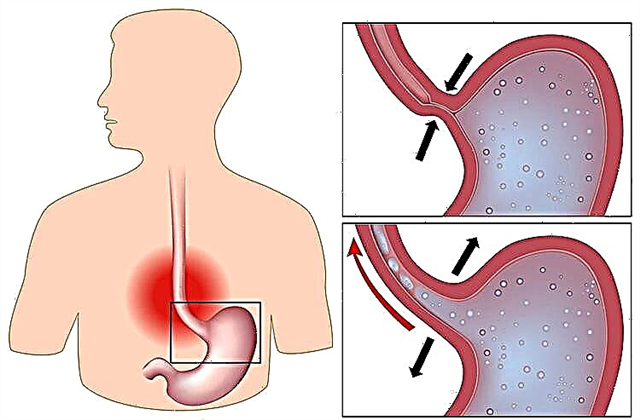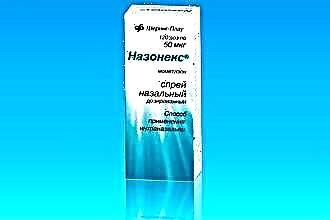It is advisable for pregnant women not to get sick at all, but for all 9 months not to get under the negative influence of a cold or ARVI, hardly anyone succeeds. If the expectant mother has a severe cough with sputum production, she needs to use an expectorant that will help the mucus drain from the respiratory tract. However, it is not so easy to find a drug that would not have a negative effect on the expectant mother and the fetus.
Danger of coughing
 It is imperative to treat a cough during pregnancy, as it can provoke negative consequences for the woman herself and the unborn baby. Bronchospasm increases the tone of the uterus, which can cause premature birth or miscarriage, especially if the fetus is low in the womb. There have also been cases of placental abruption, which negatively affects bearing and the resolution of pregnancy.
It is imperative to treat a cough during pregnancy, as it can provoke negative consequences for the woman herself and the unborn baby. Bronchospasm increases the tone of the uterus, which can cause premature birth or miscarriage, especially if the fetus is low in the womb. There have also been cases of placental abruption, which negatively affects bearing and the resolution of pregnancy.
It should be borne in mind that, along with sputum, pathogenic microorganisms and their waste products leave the respiratory tract. Normal excretion of mucus prevents intoxication of the body and the spread of infection to nearby organs.
If the expectant mother cannot cough up the secreted secretion, she risks getting serious complications such as bronchitis, bronchial asthma or pneumonia. It is imperative to treat a cough, this is the only way to save the fetus and the woman.
Difficulty of choice
The problem with cough treatment is that pregnant women are prohibited from most drugs that help drain mucus. Many effective expectorants have a central action and affect the respiratory center ("Codeine"). Such drugs are categorically contraindicated, especially in the first trimester of pregnancy, they have an effect similar to morphine, and are not included in the course of therapy for pregnant women.
 From the second trimester, it is possible to take centrally acting agents, but only those that do not affect the respiratory center. It must be remembered that the possibility of negative consequences from their use remains at a later date.
From the second trimester, it is possible to take centrally acting agents, but only those that do not affect the respiratory center. It must be remembered that the possibility of negative consequences from their use remains at a later date.
The choice of drugs should only be made by the doctor after a thorough assessment of all possible risks to the expectant mother and fetus. In extreme cases, pregnant women can take the following medications:
- Ambrobene;
- Bromhexine;
- Ambroxol;
- "Dastozin";
- "Sinekod";
- Oxeladin.
How to be treated safely
It is safe to use expectorants during pregnancy if they do not contain harsh chemicals and do not cross the placenta. The simplest and most time-tested folk methods fall into this category. They will not help to immediately cure the cause that caused the cough, but they will ease the condition of the expectant mother without harm to her body and the body of the developing fetus. Let us consider in more detail what exactly can be done to improve sputum discharge.
Inhalation for pregnant women
Breathing in vapors is very helpful in relieving coughs. Healing components, which are added to hot water, act directly in the focus of infection, they help relieve swelling from the mucous membrane, disinfect it, contribute to rarefaction and the fastest discharge of sputum. Consider a few effective recipes.
 Collection. The following components should be added to boiling water: oil of any coniferous tree or coniferous extract (2 drops), eucalyptus oil (2 drops), garlic (1 squeezed clove). You need to breathe over the mixture through your nose and mouth for 5-10 minutes.
Collection. The following components should be added to boiling water: oil of any coniferous tree or coniferous extract (2 drops), eucalyptus oil (2 drops), garlic (1 squeezed clove). You need to breathe over the mixture through your nose and mouth for 5-10 minutes.- Soda solution. For 2 liters of boiling water, you need to take 4 tablespoons of soda, breathe over the bowl, without covering yourself with a towel, take deep breaths with your nose and mouth. You can replace soda with alkaline mineral water, for example, "Borjomi".
- Essential oils. Oil of coniferous trees (thuja, fir, pine), camphor oil or thyme oil can be used for inhalation. No more than 2 drops of funds are dripped into the water, they can be used only if the expectant mother does not suffer from allergies.
Drinking plenty of fluids
Frequent fluid intake has a positive effect on sputum dilution and its removal from the respiratory tract. It is especially useful for expectant mothers to drink healing drinks, which not only increase the secretion of the ciliated epithelium, which is responsible for the secretion of mucus, but also have a positive effect on the respiratory tract.
Consider several effective and safe expectorant recipes.
 Figs and milk. This is not only useful, but also a tasty medicine that expectant mothers will like. To prepare it, we need 7 fruits of ripe or dried figs, fill them with milk and put on a small fire. You need to cook the mixture for a long time, at least half an hour, its color will tell about readiness - it should turn slightly brown. After the medicine has cooled down a little, you need to pull the fruits out of it and squeeze their juice into a glass. Take a drink 3-4 times a day warm.
Figs and milk. This is not only useful, but also a tasty medicine that expectant mothers will like. To prepare it, we need 7 fruits of ripe or dried figs, fill them with milk and put on a small fire. You need to cook the mixture for a long time, at least half an hour, its color will tell about readiness - it should turn slightly brown. After the medicine has cooled down a little, you need to pull the fruits out of it and squeeze their juice into a glass. Take a drink 3-4 times a day warm.- Milk, honey and butter. Add a teaspoon of natural honey and a small piece of butter to a glass of warm milk. Such a cocktail should be consumed warm, drink 1/2 cup 3 times a day, before going to bed you can drink a full glass.
- Borjomi and milk. Gas must first be released from mineral water, as it is not useful for expectant mothers. We heat the mineral water, but do not bring it to a boil, mix it with warm milk in a ratio of 1: 3. If you wish, you can add honey to the drink.
Also, pregnant women need to consume as many healthy drinks as possible. It should be natural juices, fruit drinks, compotes, lemon tea, herbal teas and infusions.
It is important - in case of impaired renal function and increased puffiness, the amount of fluid consumed must be strictly controlled.
Precautionary measures
 Pharmaceutical preparations for pregnant women are selected especially carefully, since they can have a negative impact on both the woman herself and her unborn baby. With folk remedies that promote coughing, things are a little easier, but there are still concerns. Any natural ingredient can provoke allergies and adversely affect the development of the fetus.
Pharmaceutical preparations for pregnant women are selected especially carefully, since they can have a negative impact on both the woman herself and her unborn baby. With folk remedies that promote coughing, things are a little easier, but there are still concerns. Any natural ingredient can provoke allergies and adversely affect the development of the fetus.
To avoid unpleasant consequences, all expectorants must be checked at the beginning of therapy for personal intolerance. To do this, you need to carry out the procedure using a small amount of medicine, and wait a few hours. If no negative reactions have been identified, then therapy is continued.
Even the simplest and most harmless formulations should be prescribed by a doctor, since for pregnant women there is a ban not only on pharmaceutical preparations, but also on many medicinal herbs and products.
Let's summarize
It is rather difficult for a pregnant woman to choose an expectorant that would give the desired effect and would not adversely affect her health and the health of her unborn child. However, there is a way out of the situation in the first trimester, when all pharmaceutical preparations are strictly prohibited.
Even the simplest medications should be taken only after a doctor's prescription, as they can cause negative reactions. If you start cough treatment on time and correctly, it will not negatively affect the condition of the woman and the fetus.

 Collection. The following components should be added to boiling water: oil of any coniferous tree or coniferous extract (2 drops), eucalyptus oil (2 drops), garlic (1 squeezed clove). You need to breathe over the mixture through your nose and mouth for 5-10 minutes.
Collection. The following components should be added to boiling water: oil of any coniferous tree or coniferous extract (2 drops), eucalyptus oil (2 drops), garlic (1 squeezed clove). You need to breathe over the mixture through your nose and mouth for 5-10 minutes. Figs and milk. This is not only useful, but also a tasty medicine that expectant mothers will like. To prepare it, we need 7 fruits of ripe or dried figs, fill them with milk and put on a small fire. You need to cook the mixture for a long time, at least half an hour, its color will tell about readiness - it should turn slightly brown. After the medicine has cooled down a little, you need to pull the fruits out of it and squeeze their juice into a glass. Take a drink 3-4 times a day warm.
Figs and milk. This is not only useful, but also a tasty medicine that expectant mothers will like. To prepare it, we need 7 fruits of ripe or dried figs, fill them with milk and put on a small fire. You need to cook the mixture for a long time, at least half an hour, its color will tell about readiness - it should turn slightly brown. After the medicine has cooled down a little, you need to pull the fruits out of it and squeeze their juice into a glass. Take a drink 3-4 times a day warm.

